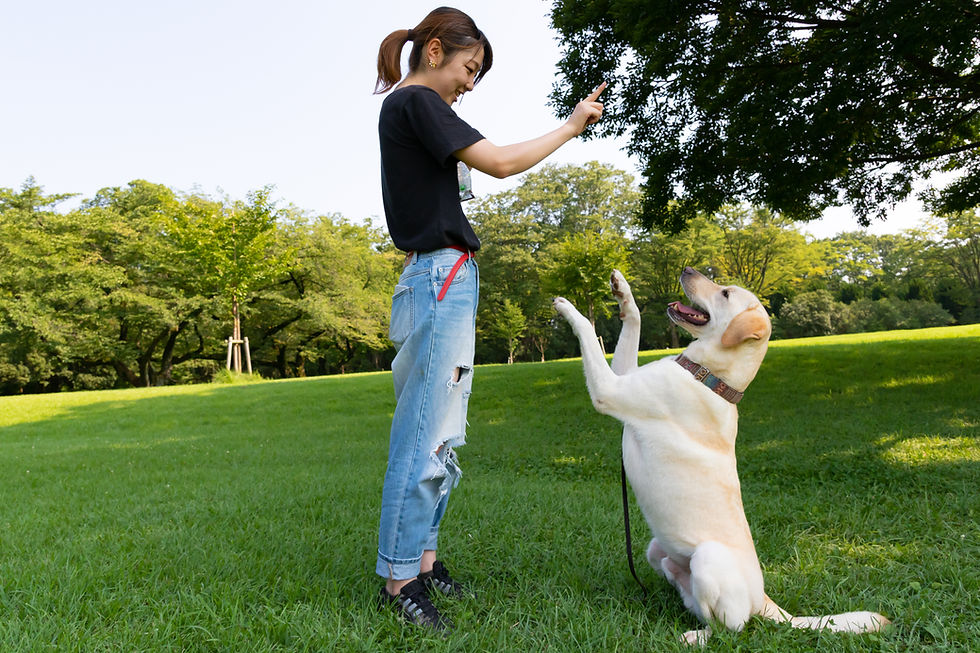Spring Is In The Air
- Awesome Dog Academy

- Mar 1, 2023
- 4 min read

The butterflies begin their flight, trailing pollen off flowers. Bird and frog song mix in the morning air. The Sun is staying up later, giving the chance of an evening stroll. Yep!! There are definitely signs that spring is coming and winter gear can start packing. Spring also is a reason for any four pawed friend to tuck tail and hide with its blooming allergies, fleas and parasites that can do unseen harm to creature companions. When it comes to seasonal uncertainties there is help in the form of prevention care. Start this season with a bounce in those paws knowing spring is set up for success!!
Does your dog have allergies?
There’s no sneezing at the facts, some dogs do suffer environmental allergies. As the seasons
change the symptoms of these allergies become more apparent. Allergies may include and are not limited to pollen, flea bites, dust and mold. Dogs with an allergy will itch and scratch beyond what is normal for a dog to experience. This amount of scratching can cause sores, hot spots, discomfort, and in some cases hair loss. Dogs with allergies are distracted from activities such as eating and playing to scratch themselves. To help pets without causing harm, monitor them to see what is creating their discomfort. Taking notes is very important to see what changes are made and what effects they are having. Once the allergen is identified it is much easier to help adjust to a life that limits exposure.
Tips:
– Keep paws clean and dry at all times. Dogs will lick their paws and get allergens off of them. Wet paws will can breed bacteria and create hot spots.
– Put a blanket down to prevent rolling in the grass on outings. Dogs still get all the fun without getting all those grass clipping they may be allergic to.
- To help reduce dust particles: replace air filters frequently and remove dust clinging items such as, rugs or carpets, fuzzy toys, and fuzzy blankets that the dog is exposed to.
Fleas and Ticks
As the excitement builds for early morning hikes, summer sports, campfire cookouts and
sleeping under the stars it is important to protect the home from unseen pests that are waking with the warmer weather. Modern advances have made this easier than ever with a visit to the vet for medications, collars, or once a month drop applications. Fleas and ticks have been brought under control over recent decades with these advances. Preventative care has given pets a unique opportunity to enter the home life to be with the family. Keeping fleas and ticks away will do more than reduce itching to comfort pet companions. Any cat or dog that isn’t protected is offering a free ride into an all expense paid bed and breakfast that is going to take weeks to get rid of. These fast multiplying guests are not as visible as ticks; however, both linger on the animal to feed on the blood of the host. Bacteria and disease entering the host blood line may cause any number of illnesses from anemia, tapeworm, Lyme disease and tick paralysis. Prevent these gate crashers from setting foot in the door!! Talk to your vet to see which prevention care is best for you and your home before spring gets in full swing.
Tips:
-Avoid walks in tall grass that will brush against dogs’ sides and shoulders. Ticks walk to the tops of the blades of grass and reach out to grab the next host. Stick to fresh cut meadows or clear walking paths to reduce these pesky interactions.
-Have a lint roller handy- before getting back in the car or walking into the house, roll doggo down to remove any loose ticks. Meanwhile the Pro-Tick Remedy tool is great for removing any ticks that are attached!!
-If there is a flea out break: wash all dog toys and bedding. Wash human bedding, pillows, and cushions. Thoroughly vacuum carpet, upholstery, curtains, tile, hardwood, and car. Most importantly immediately place the vacuum bag in a tightly sealed plastic bag and place into exterior garbage. Vacuum all surfaces regularly to prevent future outbreaks.
Mosquitoes
As the sun sets and the grill starts there is the ever so familiar tickle on the back of the neck
before…ow!! The first mosquito!! It isn’t just the bbq that’s at risk. Mosquitoes have been around and they get around. As they go from pup to pup they carry the chance of bringing harmful heartworms and other illnesses into the equation. Waiting to see a mosquito may be too late. Mosquitoes have been found in all fifty states of the USA and require year round protection for adequate care. If a dog becomes infected with heartworms they can be tested by your vet. Treatments are slow, require the dog to rest completely, and have no guarantee of success. Signs of infection may not show for months to a year depending on the health of the dog and number of worms. These signs may include reduced exercise or decrease in play time from what is normal, no longer running, taking excessive naps, dramatic weight loss and coughing. Get back to the grilling and leave mosquitoes behind by keeping dog’s up to date with monthly preventative care, all year long.
Tips:
-Keep the area free of standing water that will attract mosquitoes for breeding
-Have monthly checkups scheduled so medications can be administered
-Avoid mosquito feeding times when possible: Dawn or Dusk
Let preventative care keep allergies and pests away this spring so adventures are the focus of everyday. Talk to your vet to see which care option is right for you.



Comments